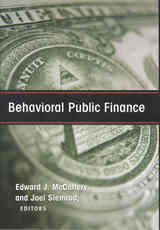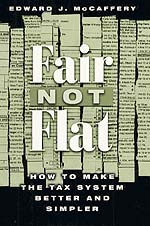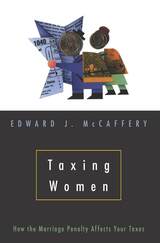3 books about McCaffery, Edward J.

Behavioral Public Finance
Edward J. McCaffery
Russell Sage Foundation, 2006
Behavioral economics questions the basic underpinnings of economic theory, showing that people often do not act consistently in their own self-interest when making economic decisions. While these findings have important theoretical implications, they also provide a new lens for examining public policies, such as taxation, public spending, and the provision of adequate pensions. How can people be encouraged to save adequately for retirement when evidence shows that they tend to spend their money as soon as they can? Would closer monitoring of income tax returns lead to more honest taxpayers or a more distrustful, uncooperative citizenry? Behavioral Public Finance, edited by Edward McCaffery and Joel Slemrod, applies the principles of behavioral economics to government's role in constructing economic and social policies of these kinds and suggests that programs crafted with rational participants in mind may require redesign. Behavioral Public Finance looks at several facets of economic life and asks how behavioral research can increase public welfare. Deborah A. Small, George Loewenstein, and Jeff Strnad note that public support for a tax often depends not only on who bears its burdens, but also on how the tax is framed. For example, people tend to prefer corporate taxes over sales taxes, even though the cost of both is eventually extracted from the consumer. James J. Choi, David Laibson, Brigitte C. Madrian, and Andrew Metrick assess the impact of several different features of 401(k) plans on employee savings behavior. They find that when employees are automatically enrolled in a retirement savings plan, they overwhelmingly accept the status quo and continue participating, while employees without automatic enrollment typically take over a year to join the saving plan. Behavioral Public Finance also looks at taxpayer compliance. While the classic economic model suggests that the low rate of IRS audits means far fewer people should voluntarily pay their taxes than actually do, John Cullis, Philip Jones, and Alan Lewis present new research showing that many people do not underreport their incomes even when the probability of getting caught is a mere one percent. Human beings are not always rational, utility-maximizing economic agents. Behavioral economics has shown how human behavior departs from the assumptions made by generations of economists. Now, Behavioral Public Finance brings the insights of behavioral economics to analysis of policies that affect us all.
[more]

Fair Not Flat
How to Make the Tax System Better and Simpler
Edward J. McCaffery
University of Chicago Press, 2002
Everyone knows that the current tax system is unfair. Some of the richest people in America pay no tax, while a huge share of the tax burden falls on the rest of us. A mere glance at the tax code confirms that it is far too complex, with volumes of rules that no ordinary person could possibly comprehend. What is to be done? Some conservatives have called for a so-called flat tax. But a flat tax is not necessarily a simple tax, and "flat" means "more" for most taxpayers: a rise in middle-class taxes to finance tax cuts for the rich. Is there another choice?
In clear, easy-to-understand language, Edward J. McCaffery proposes a straightforward and fair alternative. A "fair not flat" tax that is consistent and progressive would tax spending, not income and savings. And if it were collected at its lower levels through a national sales tax, most people would not have to file a return. A supplemental tax on spending for the wealthiest individuals would make the national sales tax progressive. Under McCaffery's system, a family of four would pay no tax on their first $20,000 in spending, and 15 percent on the next $60,000. Only the few families who spend more than $80,000 a year would be subject to the supplemental tax. Necessities would be taxed less than ordinary and luxury items. No one would be taxed directly on savings. The estate and gift or so-called death tax would be abolished, for the simple reason that dead people don't spend. The "fair not flat" tax would fall on heirs when and as they spend their good fortune. Perhaps best of all, most Americans would not have to fill out tax returns.
Simpler, more efficient, fairer, and more reflective of America's current social values, McCaffery's "fair not flat" tax could help get us out of the tax mess that politicians and special interests have gotten us into, improving the whole country in the process. Read Fair Not Flat to find out how.
“In Fair Not Flat, Mr. McCaffery lays out the case for a consumption tax. He does so in a reader-friendly way, presenting his argument with very few footnotes, equations or technical terms. The consumption of the book, so to speak, is not at all taxing. And its argument is well worth pondering.”—Bruce Bartlett, Wall Street Journal
In clear, easy-to-understand language, Edward J. McCaffery proposes a straightforward and fair alternative. A "fair not flat" tax that is consistent and progressive would tax spending, not income and savings. And if it were collected at its lower levels through a national sales tax, most people would not have to file a return. A supplemental tax on spending for the wealthiest individuals would make the national sales tax progressive. Under McCaffery's system, a family of four would pay no tax on their first $20,000 in spending, and 15 percent on the next $60,000. Only the few families who spend more than $80,000 a year would be subject to the supplemental tax. Necessities would be taxed less than ordinary and luxury items. No one would be taxed directly on savings. The estate and gift or so-called death tax would be abolished, for the simple reason that dead people don't spend. The "fair not flat" tax would fall on heirs when and as they spend their good fortune. Perhaps best of all, most Americans would not have to fill out tax returns.
Simpler, more efficient, fairer, and more reflective of America's current social values, McCaffery's "fair not flat" tax could help get us out of the tax mess that politicians and special interests have gotten us into, improving the whole country in the process. Read Fair Not Flat to find out how.
“In Fair Not Flat, Mr. McCaffery lays out the case for a consumption tax. He does so in a reader-friendly way, presenting his argument with very few footnotes, equations or technical terms. The consumption of the book, so to speak, is not at all taxing. And its argument is well worth pondering.”—Bruce Bartlett, Wall Street Journal
[more]

Taxing Women
Edward J. McCaffery
University of Chicago Press, 1997
Taxing Women comprises both an insightful, critical analysis of the gender biases in current tax laws and a wake-up call for all those concerned with gender justice to pay more attention to the pervasive impact of such laws. Providing real-life examples, Edward McCaffery shows how tax laws are actually written to punish married couples who file jointly. No dual-income household can afford not to read this book before filing their taxes.
"Taxing Women is a must-have primer for any woman who wants to understand how our current tax system affects her family's economic condition. In plain English, McCaffery explains how the tax code stacks the deck against women and why it's in women's economic interest to lead the next great tax rebellion."—Patricia Schroeder
"McCaffery is an expert on the interplay between taxes and social policy. . . . Devastating in his analysis. . . . Intriguing."—Harris Collingwood, Working Women
"A wake-up call regarding the inequalities of an archaic system that actually penalizes women for working."—Publishers Weekly
"Taxing Women is a must-have primer for any woman who wants to understand how our current tax system affects her family's economic condition. In plain English, McCaffery explains how the tax code stacks the deck against women and why it's in women's economic interest to lead the next great tax rebellion."—Patricia Schroeder
"McCaffery is an expert on the interplay between taxes and social policy. . . . Devastating in his analysis. . . . Intriguing."—Harris Collingwood, Working Women
"A wake-up call regarding the inequalities of an archaic system that actually penalizes women for working."—Publishers Weekly
[more]
READERS
Browse our collection.
PUBLISHERS
See BiblioVault's publisher services.
STUDENT SERVICES
Files for college accessibility offices.
UChicago Accessibility Resources
home | accessibility | search | about | contact us
BiblioVault ® 2001 - 2024
The University of Chicago Press









